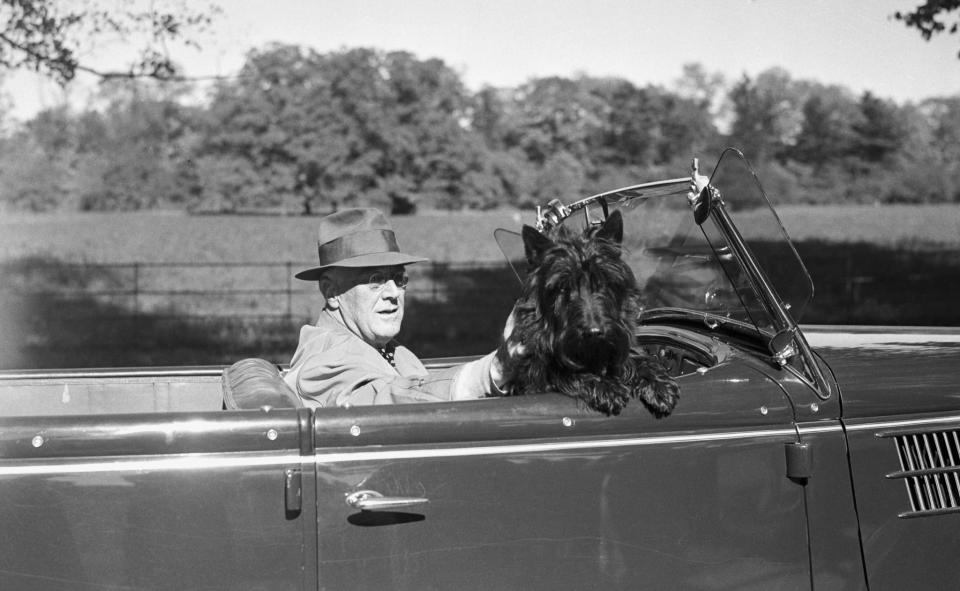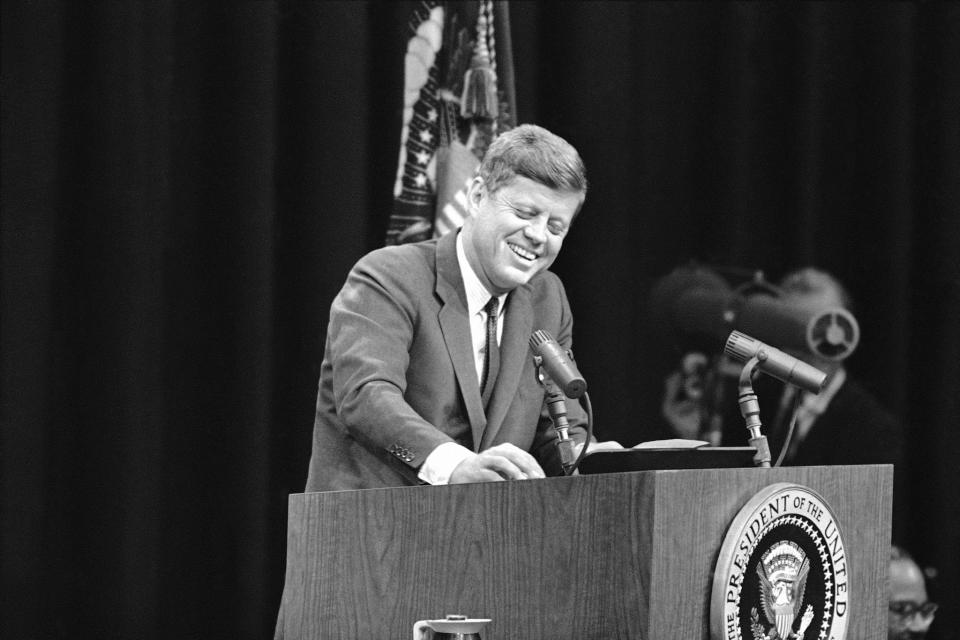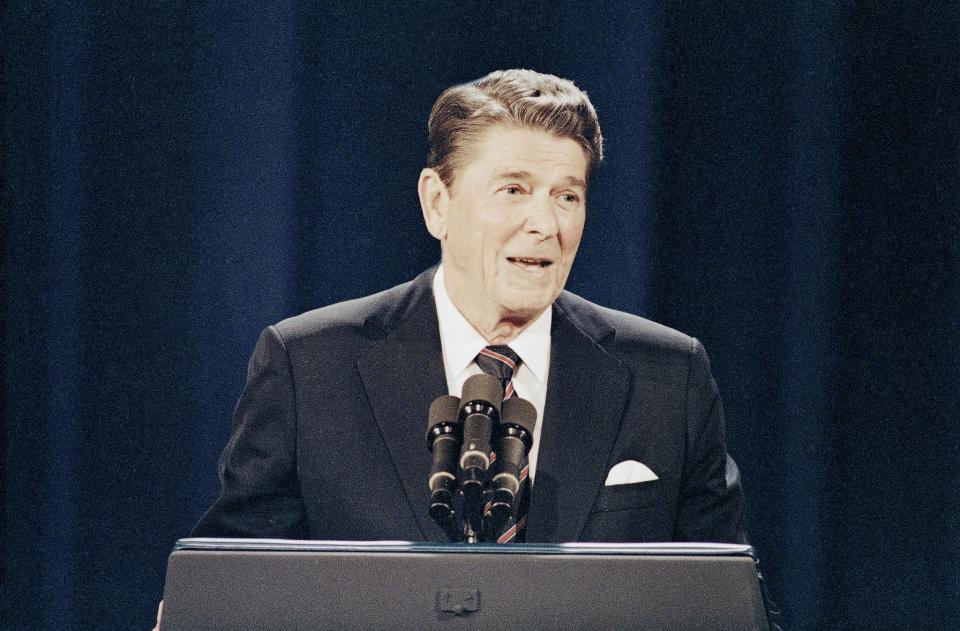Two presidential candidates walk into a bar. Nobody laughs. The humorless 2016 campaign.

What would be worse than electing Donald Trump (or, depending on your politics, Hillary Clinton) in November? A second four-year term! It’s a pretty lame joke, but in the midst of the most bitter contest in modern presidential elections, it has a glint of humor. In such a brutal and ugly campaign, the country needs, as never before, its politics leavened with humor. Many of our most successful politicians throughout history have had the wisdom to understand and act on that, but not the two presidential candidates running this year. Trump is incapable of poking fun at himself and confuses sophomoric mean-spiritedness with humor (making fun of a disabled reporter). Clinton is hardly known as a barrel of laughs or a happy warrior. While “Saturday Night Live” has provided the country with some comic relief, there is no substitute for the candidates themselves using humor as a way to connect with voters and disarm critics.
In the current campaign, few things have been more damning for Trump than the harsh, abusive attacks he has unleashed, unleavened with any hint of humor. Voters grow tired of scolds who offer no moments of comic relief. Even at the Al Smith dinner in New York on last Thursday, Trump broke tradition by mixing humor with abuse. In an unprecedented reaction, the audience booed. During the debates, Hillary Clinton smiled through many of Trump’s attacks, but it was no substitute for a funny retort that would have endeared her to millions of viewers.

Yet the country’s most admired presidents in the last 150 years were all men with a fine sense of humor who understood how to parry attacks with answers that left critics laughing. Lincoln, FDR, JFK and Reagan had brilliant ripostes to their tormentors.
When Lincoln was attacked as a two-faced liar, he replied: If I had another face, why would I be wearing this one?
As with all presidents, Franklin Roosevelt disliked being criticized. But he hid his anger behind a mask of amiability. During the 1944 campaign, Roosevelt gave a delightfully funny speech — what many thought was the best of his career. It not only disarmed critics, it diverted attention from his failing health. The speech in Washington, D.C., before a friendly International Brotherhood of Teamsters audience was made notable by a reference to his dog Fala. “These Republican leaders,” he said, “have not been content with attacks on me, or my wife, or on my sons. No, not content with that, they now include my little dog Fala. Well, of course I don’t resent attacks, and my family doesn’t resent attacks, but Fala does resent them. You know, Fala is Scotch, and being a Scottie, as soon as he learned that the Republican fiction writers in Congress and out had concocted a story that I had left him behind on the Aleutian Islands and had sent a destroyer back to find him — at a cost to the taxpayers of two or three, or eight or 20 million dollars — his Scotch soul was furious. He has not been the same dog since. I am accustomed to hearing malicious falsehoods about myself — such as that old worm-eaten chestnut that I have represented myself as indispensable. But I think I have a right to resent, to object to libelous statements about my dog.” The audience roared with laughter.

John F. Kennedy had an infectious humor. After appointing his brother Robert attorney general at the start of his presidency, Kennedy parried criticism by telling the press that he wanted to give his brother, who held a law degree from the University of Virginia, “a little legal practice before he becomes a lawyer.” Bobby, who was humorless, upbraided his brother, “Jack, you shouldn’t have said that about me.” Jack replied: “Bobby, you don’t understand. You’ve got to make fun of it, you’ve got to make fun of yourself in politics.” The president’s sense of humor blunted the criticism.
Kennedy used his press conferences as a chance to display his wit. Arthur Schlesinger, one of the intellectuals close to the Kennedy White House, remembered them as “a superb show, always gay [in the 1960s sense of the word], often exciting, relished by the reporters and television audiences” as he showed off his “terse, self-mocking wit.” Kennedy described the news conferences as “The Six O’Clock Comedy Hour.” At one of these meetings, he was asked to provide some philosophical wisdom about being president. He replied, “I have a nice home, the office is close by and the pay is good.” Asked what he thought about his brother’s first appearance before the Supreme Court, he declared: “He did a very good job, according to everyone I talked to: Ethel, Jackie, Teddy,” referring humorously to Bobby’s wife, the first lady, and the president’s youngest brother.

Ronald Reagan was masterful at deflecting hostile questions with humor. As governor of California he had promised not to support a withholding tax provision that would give the state prompt access to public finds. When the state found itself in fiscal difficulty, he signed a withholding tax bill into law. A reporter at a press conference asked: “We thought you said your feet were in concrete on that issue.” He replied: “Gentlemen, the sound you hear is the concrete breaking about my feet.” In 1984, as he confronted concerns that he was too old for a second term (he was then 73), he used a debate with Walter Mondale, his 56-year-old opponent, to shrewdly refute the complaint. Reagan declared: “I am not going to exploit for political purposes my opponent’s youth and inexperience.” Even Mondale had to laugh at the president’s charming counter.
Come Nov. 9, we know at least one candidate will be smiling. And it’s a safe bet that the loser won’t repeat the late Rep. Morris Udall’s immortal concession after losing the 1976 Democratic nomination to Jimmy Carter: “The people have spoken. The bastards.”
_____
Robert Dallek is the author of several presidential biographies. His new book, Prophet of a New Order: FDR in Depression and War, will be published next year by Viking/Penguin.



